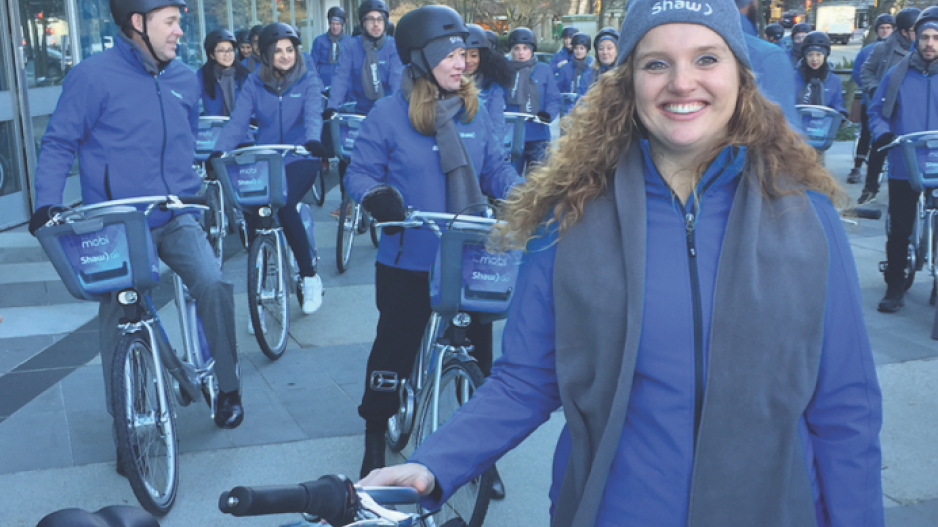Shaw Communications Inc.’s decision to partner with Vancouver’s Mobi by Shaw Go bike-share program for at least five years is a win-win deal, according to marketing professors.
Although the Calgary-based telecommunications giant is not revealing how much it is spending to wrap Mobi’s nearly 1,500 bikes with Shaw branding and provide the system’s 94 current stations with Wi-Fi, observers say the move is strategically smart.
Not only does Shaw get to associate its brand with an initiative that many view in a positive light, it also gets to put its brand on a swarm of moving billboards and connects the brand with a demographic that is likely to buy Shaw products such as mobile phone plans and Wi-Fi.
“They’re really painting themselves the right colour here and showing that they care about social equity,” said Simon Fraser University Beedie School of Business marketing professor Lindsay Meredith.
“They show that they’re trying to keep fossil fuels down and are providing a transportation mechanism for people who are poor and can’t afford cars.”
Another strategic advantage of the move for Shaw is the amount of visible exposure the brand will get, Meredith added.
“The average commuter who drives his car into work can be exposed to 5,000 ads a day. So how do I get through to you? With repetition.”
The third benefit to putting the branding on the bikes is that the bike-share program’s members are key target customers because they are likely to own mobile phones and use Wi-Fi, said University of British Columbia Sauder School of Business marketing professor Darren Dahl.
“Shaw taps into a specific consumer segment: younger and typically more environmentally conscious,” he said.
“Garnering favourable brand impressions from their effort here, amongst this group, is probably deemed as valuable to the organization.”
That value comes because younger people are far more likely to have smartphones. They are also more likely to need Wi-Fi.
Dahl called the move a “win-win” because Mobi gets financial support for its upstart operation and reduces the risk of failing.
Mobi also gets the advantage of having its stations Wi-Fi-enabled, thereby potentially attracting customers who are as interested in buying a membership for the free Wi-Fi access as for the bikes themselves.
Mobi general manager Mia Kohout told Business in Vancouver that she believes that tourists bought a large chunk of the more than 5,000 day passes that have been purchased from the program.
Making free Wi-Fi part of the day-pass offering increases the value of the product and is particularly attractive to tourists, who might not want to use their own data plan because of roaming charges, Meredith said.
Despite the new sponsorship, Mobi faces an uphill climb given the struggles that many bike-share programs have faced across North America.
The City of Seattle plans to end its Pronto bike-share program in March because of continuing losses even though it landed Alaska Airlines as a sponsor.
Kohout said that Mobi membership is ahead of its expectations, with more than 5,000 annual or monthly members and more than 130,000 rides taken to date.
She remains optimistic that the 24-employee program will exceed its initial projection of 10,000 members by the end of the first year.
Mobi was expected to operate at a loss for at least the first year and perhaps on an ongoing basis.
The City of Vancouver pumped $5 million into capital costs to get the program started. It also contributed $1 million into various other startup costs and committed $500,000 per year in each of the first five years. •




